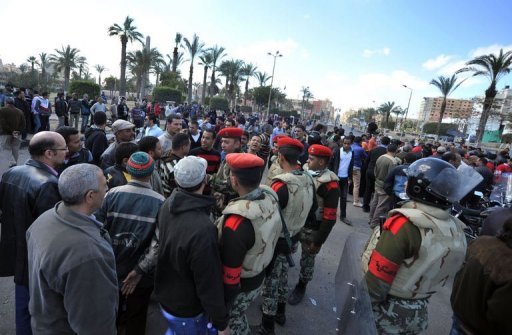CAIRO: The Journalists’ Syndicate on Saturday screened a documentary film on the independence of Egypt’s judiciary over the past 50 years, highlighting the events of 2006.
The film, titled “Kish Malek (Checkmate), starts with the events of 1969 when late president Gamal Abdel Nasser decided to dismiss more than 100 sitting judges after they refused to join the Socialist Union.
It then chronicles the events that occurred during the 1970s, when then president Anwar Sadat ordered the retrial of political prisoners after they were found innocent. The judges again found them innocent and set them free.
Fast forward to the 2006 Judges Club elections, the government interference and the arrests of prominent Judges Hesham El-Bastawisy and Mahmoud Mekky, which caused a public outcry as demonstrators took to the streets in solidarity with judges demanding independence from the clutches of the government.
Directed by Mahmoud Saber and produced by One Shot group – with the support of the Journalists’ Syndicate’s freedoms committee, led by Mohamed Abdel Qoddous – “Checkmate was produced in seven months.
“We believe in the importance of documenting Egypt’s history, especially the last 50 years of the 20th century. We made a film called ‘El-Morabetoon’ about the wars Egypt entered and then this film, Saber said.
“This film is my way of saying no to the current regime, he added.
The film also tackled the 27-year-old emergency law, which in May was extended by two years amid a flurry of opposition. It also emphasized the importance of judicial independence and respecting the constitution, stressing that judges will always be independent.
People involved in the 2006 events surrounding the Judges Club were interviewed, namely Judge Hesham El-Bastawisy, head of the Court of Cassation, and Judge Hesham Genina, secretary general of the Judges Club. There were also interviews with Essam El-Erian, head of the Muslim Brotherhood political bureau, and MB Deputy Head Mohamed Habib along with Nasserist activist Nada Kassas and Samir Ghatas, a leader in the student movements of the 1970s. The list goes on to include Bothaina Kamel from the Shayfenkom movement, Al-Masry Al-Youm s Chief Editor Magdy El-Galad, George Ishaq of the opposition Kefaya movement and blogger Wael Abbas.
However, the 50-minute film did not include any government figures and did not present their point of view.
“I didn’t expect this reaction from the viewers. They clapped even before the film ended. I thank everyone who participated in producing this film, he told Daily News Egypt.
The crew had to overcome a number of obstacles – such as guests’ reluctance to participate for free and the challenges that come with being a small, private production company.
Despite the challenges, Saber is already thinking about new film ideas. But first, he will enter film festivals with this documentary, which has been welcomed by audiences so far.
Commenting on the movie, El-Bastawisy said, “The movie documents a very important event: Egyptian people who are always accused of being passive and ignorant reacted to this issue in an unprecedented way.
“The public recognized that there will be no freedom without the freedom of the judiciary. All problems are related to judicial independence and just elections, he added.
Ramy Abdel-Razeq, a film critic who attended the screening, said, “From an artistic point of view, the film lacks a visual equivalent to the sound, especially in the first half. It was boring to see people talking – regardless of how interesting the subject is – he could have used some visual material like newspapers headlines and pictures.
The film, he added, lacked the government’s point of view, which would have made it more objective and made for a stronger assessment, Abdel-Razeq added.
At the start of the ceremony, participants took a moment of silence in honor of Abdel Wahab El-Messeiry, coordinator of the Kefaya Movement for Change, who passed away last week.
At the end of the event, a number of people shouted slogans in support of the judges.

